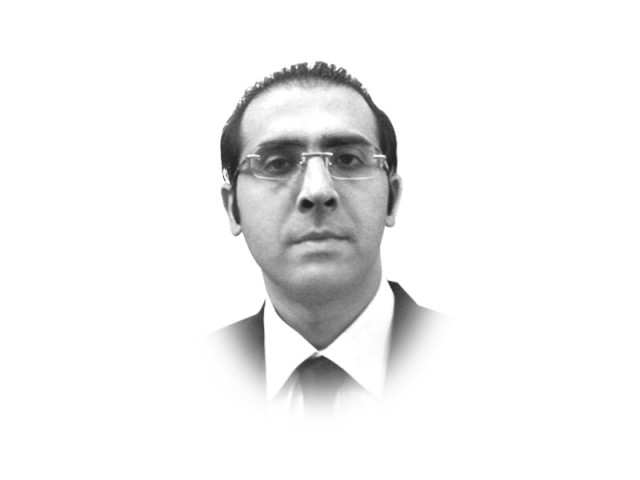Do we need to talk to the Taliban?
Let's hope that military and political forces realise that it is not only impossible to negotiate; it is also indecent

The writer is a lawyer and partner at Ijaz and Ijaz Co
in Lahore
saroop.ijaz@tribune.com.pk
Now, it seems we prepare to go lower. The Taliban have made an ‘offer’ for negotiations and also proposed the name of guarantors acceptable to them. The audacity is breathtaking. Reflect on this a moment, for them to not only make an “offer”; an offer with very precise pre-conditions. This comes after openly admitting, rather boastfully of killing thousands of our innocent men, women and children. After beheading our brave soldiers and making snuff films, after taking responsibility for attacks on hospitals, schools and shrines. So soon, after they murdered one of our bravest statesmen, Shaheed Bashir Bilour. It should be an easy call; we treat an ‘offer’ like this with contempt and say you do not get to turn it on and off at will. Perhaps, we may even settle for a milder “no, thank you, we will rather have justice”. Yet, instead we have mass, uncritical deference. It is a very unflattering endorsement (if not an indictment) of the three guarantors named; namely Mian Nawaz Sharif, Maulana Fazlur Rahman and Syed Munawar Hasan. We do not have exaggerated expectations from the two holy men. Mian Sahib on the other hand has played a positive role of late and showed great statesmanship; in reaffirming his commitment to democracy. Yet, it seems once you get within striking distance of being ‘Ameer-ul-Momineen’, you never really go back. His reasons for refusing to be a guarantor are that he does not consider this federal government “credible” enough. Regardless of what one’s view of this government is, to mention the credibility of an elected government with that of self-confessed terrorists in the same breath is ridiculous. Mr Imran Khan rightly receives a fair bit of criticism for his confusion on the matter and in the interest of single standards; there is no reason why Mian Sahib should be spared these unpleasant questions.
To speak of solidarity with Malala and Shaheed Bilour and at the same time encouraging surrender to the assailants is trying to have it both ways. These are mutually destructive positions. No one can agree with both who shoot at a child for “promoting secularism” and the child; at least not while being honest. The only possibly ‘well meaning’ argument for ‘talks’ with the TTP is otherwise when and how does this end? We do not know when, although we do know how; when one side conclusively wins. The argument against any ‘talks/dialogue’ is that their demands are impossible to comply with. If such an attempt is to be made, it would entail a complete and abject abandonment of all our core principles and hence would make the term ‘dialogue’ horribly inaccurate and insincere. The appropriate term then would be ‘surrender’. The first step for those who wish to advocate this route will have to be that they are first honest enough to call it by the right name. Secondly, they have to admit that they find nothing in our society, culture or system that they feel is worth saving.
There are, of course, other standard arguments for this surrender, which it seems we are condemned to periodically revisit. To take only two, firstly the TTP is entirely CIA/Raw etc. agents, which is the JI and affiliates position. Surely, being the patriots that they are they would not encourage the federal government to enter into a submissive agreement with foreign intelligence agencies. On the opposite end of the ideological spectrum there is that it is a blowback to excesses of imperialism. Imperialism admittedly is a question that we face, but it is disingenuous to draw a causal link in this case. It is also useful for comrades to return to dialectics once in a while or at least definitions. The Taliban impose ‘serfdom’; they yearn for ‘Imperialism’ in the most tautological and literal sense. It is exhausting to make the other obvious points that they use the ‘negotiation bait’ and our confusion to consolidate and regroup etc.
Everyone in Pakistan is a stakeholder in this argument, yet none more so than the ANP. The ANP has been in the frontlines and the most directly attacked in recent times, and to their credit have shown great courage and resilience. Hence, Mian Iftikhar Hussain and Haji Ghulam Bilour looking at the ‘offer’ as a positive development present a stiffer challenge. It reflects grimly on our state; the ANP cannot fight this alone. The state cannot afford to abandon the ANP. These terrorists have to be fought and the full might of the state summoned. The resolve by the state, primarily the military leadership has to be unambiguous. The cost of confusion is thousands of our brave soldiers martyred in this struggle. Let us hope that the military, and the political forces realise that it is not only impossible to negotiate; it is also indecent.
Published in The Express Tribune, February 10th, 2013.















COMMENTS
Comments are moderated and generally will be posted if they are on-topic and not abusive.
For more information, please see our Comments FAQ